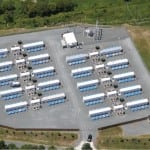A new rule enacted by the Federal Energy Regulatory Commission (FERC) on Thursday orders organized wholesale power market operators to pay “just and reasonable rates” for providers of regulation service, an ancillary transmission service that protects the grid by correcting deviations in grid frequency and balance on transmission lines with neighboring systems.
Order No. 755 will take effect 60 days from publication in the Federal Register. Essentially, it will require organized markets to include in their tariffs a two-part market-based compensation method for regulation service. First, all cleared resources would receive a uniform capacity payment, to include opportunity costs, for standing ready to provide frequency regulation service. Second, each resource would receive a market-based performance payment for the service. This payment also would reflect a resource’s accuracy of performance.
“The level of compensation will be established by the competitive workings of the [regional transmission operator (RTO)] markets for this service,” FERC Chairman Jon Wellinghoff said in a statement.
Wellinghoff added that the commission was aware that different resources had different capabilities to ramp quickly and respond accurately to the system operator’s signal to correct frequency deviations. “Several RTOs told us that they are already examining how best to use these new capabilities that are made possible through advances in technology and computing. But it became clear that, by not compensating for the amounts of frequency regulation service that different resources provide, organized markets do not adequately compensate for the additional work performed by faster and more accurate resources,” he said.
Frequency regulation service is provided by generators and from storage technologies such as flywheels and electric vehicles, demand response resources, and possibly even residential water heaters. “Adjusting the compensation for regulation service providers will recognize the amount of service resources provide, thus correcting the price signal for faster-ramping resources,” FERC said. “This will allow market operators to take advantage of the capabilities of faster-ramping resources to improve operational and economic efficiency of the transmission system and reduce costs to consumers in organized wholesale markets.”
The order, which was unanimously approved by the five-member commission, remedies “undue discrimination” and ensures “just and reasonable rates for providers of a service that organized wholesale power market operators use to balance supply and demand and ensure the reliability of their systems,” the federal regulatory body added.
The Electricity Storage Association (ESA) hailed the new final rule, saying it would “begin to set the structure for fast-responding resources to be paid for actual performance.”
The industry group urged FERC to approve the rule because, it said, “paying for performance on the bulk power system will sustain the viability of existing advanced storage regulation plants; encourage investment in future storage facilities; and enable the grid and consumers to experience the economic, reliability and environmental benefits that fast-responding resources bring to the grid.”
Flywheel-maker Beacon Power also applauded the rule. “We have shovel-ready energy storage projects along with associated potential jobs that have been waiting for financial commitments from investors," said Judith Judson of Beacon Power and chairperson of the ESA Advocacy Council. "With this final rule, we hope to see a much greater willingness by the private sector to support these new technologies. We urge FERC and the grid system operators to work toward timely implementation of the rule."
Sources: POWERnews, FERC, ESA









